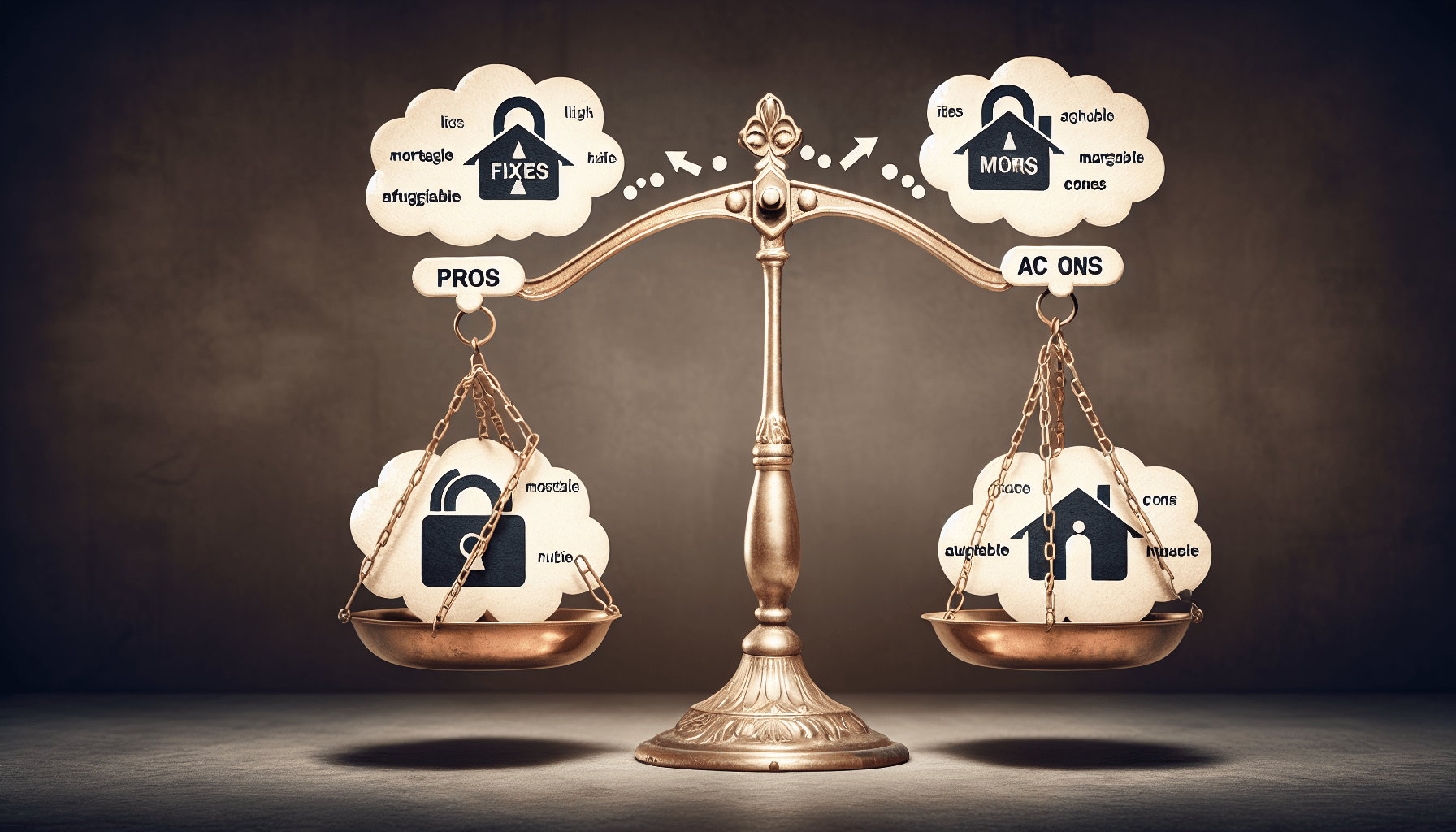When considering whether to use a fixed-rate or adjustable-rate mortgage (ARM) for your home loan, it’s important to weigh the pros and cons of each option. A fixed-rate mortgage offers the stability of a constant interest rate throughout the loan term, providing predictability in monthly payments. On the other hand, an ARM initially offers lower interest rates and monthly payments, but these rates can fluctuate over time. Considering your financial goals, risk tolerance, and plans for the future can help you determine which type of mortgage is best suited for your needs. Ultimately, by making an informed decision, you can embark on the path to homeownership with confidence.
Should I Use A Fixed-rate Or Adjustable-rate Mortgage (ARM) For My Home Loan? (pros And Cons)
When considering options for your home loan, one of the key decisions you will need to make is whether to go with a fixed-rate mortgage or an adjustable-rate mortgage (ARM). Both options have their own set of pros and cons, and understanding them is crucial in making an informed decision that aligns with your financial goals and circumstances.
Understanding Fixed-rate Mortgages
A fixed-rate mortgage is a type of home loan where the interest rate remains constant throughout the life of the loan. This means that your monthly mortgage payments will remain the same, providing predictability and stability in your housing expenses.
Fixed-rate mortgages are a popular choice for many homeowners because they offer peace of mind in knowing exactly how much they need to pay each month. This can be especially beneficial for those on a tight budget or those who prefer a more conservative approach to managing their finances.
On the flip side, fixed-rate mortgages typically come with slightly higher interest rates compared to adjustable-rate mortgages. This higher rate is a trade-off for the stability and predictability that a fixed-rate mortgage offers.
Pros of Fixed-rate Mortgages
When weighing the pros and cons of a fixed-rate mortgage, consider the following advantages:
- Predictability: Your monthly payments remain the same, making it easier to budget and plan for other expenses.
- Stability: You are protected from fluctuations in interest rates, providing peace of mind knowing your rate won’t change.
Cons of Fixed-rate Mortgages
However, there are also some drawbacks to consider:
- Higher Interest Rates: Fixed-rate mortgages typically have higher interest rates compared to adjustable-rate mortgages.
- Potential Cost: If interest rates drop significantly, you may miss out on potential savings by being locked into a higher rate.
Exploring Adjustable-rate Mortgages (ARM)
An adjustable-rate mortgage (ARM) is a type of home loan where the interest rate can change over time based on market conditions. Typically, ARMs start with a lower introductory rate for a set period before adjusting periodically.
One of the main advantages of an ARM is the lower initial interest rate compared to fixed-rate mortgages. This lower rate can result in lower initial monthly payments, making it an attractive option for certain borrowers, especially those who plan to sell or refinance their home before the introductory rate period ends.
However, it’s important to note that as the interest rate fluctuates, your monthly mortgage payments can also vary, which may pose a financial risk to some borrowers, especially if interest rates rise significantly.
Pros of Adjustable-rate Mortgages (ARM)
Consider the following benefits of an adjustable-rate mortgage:
- Lower Initial Rates: ARMs typically offer lower initial interest rates compared to fixed-rate mortgages.
- Potential Savings: If interest rates decrease, you may benefit from lower monthly payments.
Cons of Adjustable-rate Mortgages (ARM)
It’s also crucial to be aware of the potential drawbacks of an adjustable-rate mortgage:
- Interest Rate Risk: Your monthly payments can increase if interest rates rise, leading to higher housing expenses.
- Uncertainty: Fluctuating interest rates can make it challenging to predict and plan for future payments.
Making the Decision: Which is Right for You?
Deciding between a fixed-rate and adjustable-rate mortgage ultimately comes down to your personal financial situation, risk tolerance, and long-term housing plans. Here are some factors to consider when making this decision:
Considerations for Choosing a Fixed-rate Mortgage:
- Stability: If you value predictability and want to avoid any surprises in your monthly payments, a fixed-rate mortgage may be the right choice.
- Long-term Plans: If you plan to stay in your home for an extended period or prefer the security of a consistent payment, a fixed-rate mortgage may be a better fit.
Considerations for Choosing an Adjustable-rate Mortgage (ARM):
- Lower Initial Rates: If you prioritize lower initial monthly payments and plan to sell or refinance before the rate adjusts, an ARM may be suitable.
- Interest Rate Outlook: If you believe that interest rates will remain stable or decrease in the future, an ARM could offer potential savings.
Comparing Fixed-rate and Adjustable-rate Mortgages
To help you visualize the key differences between fixed-rate and adjustable-rate mortgages, here is a comparison table outlining the main differences:
| Aspect | Fixed-rate Mortgage | Adjustable-rate Mortgage (ARM) |
|---|---|---|
| Interest Rate | Fixed throughout loan term | Initial fixed rate, then adjustable |
| Monthly Payments | Consistent | May fluctuate based on interest rate changes |
| Initial Rates | Higher than ARMs | Lower than fixed-rate mortgages |
| Predictability | High | Limited |
| Interest Rate Risk | Low | High (potential increases) |
| Suitability | Stable financial situation | Short to medium-term ownership plans |
By weighing the pros and cons of each option and considering your unique financial circumstances and housing goals, you can make an informed decision on whether a fixed-rate mortgage or an adjustable-rate mortgage is the right choice for your home loan. Remember to consult with a mortgage professional and carefully review your options before making a final decision to ensure you select the best mortgage product for your needs.



